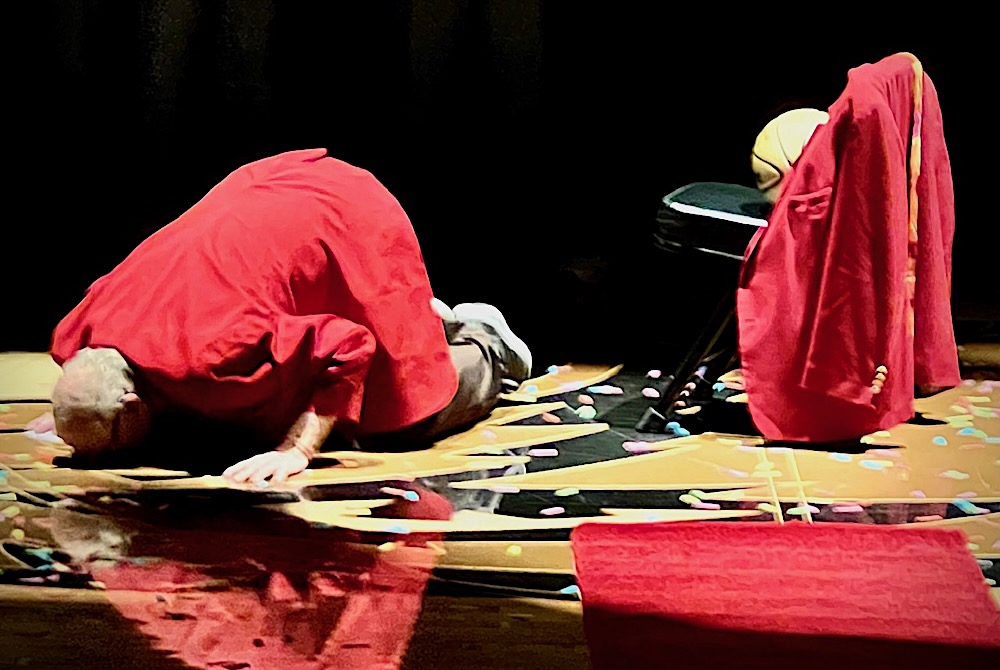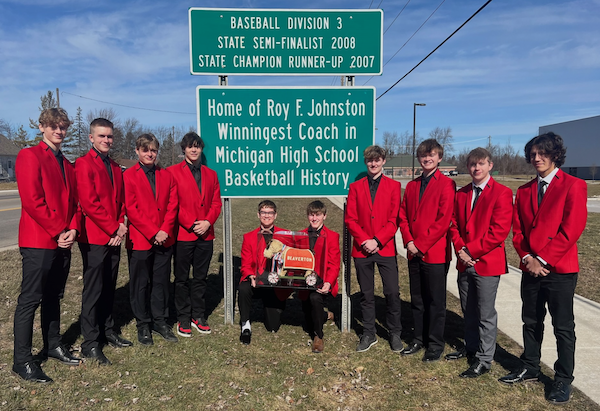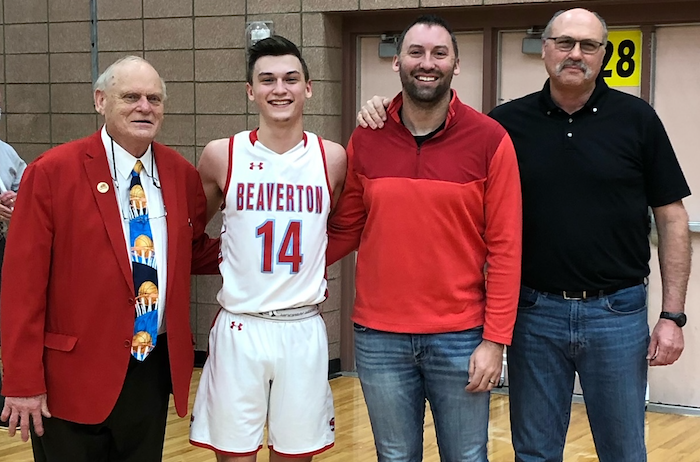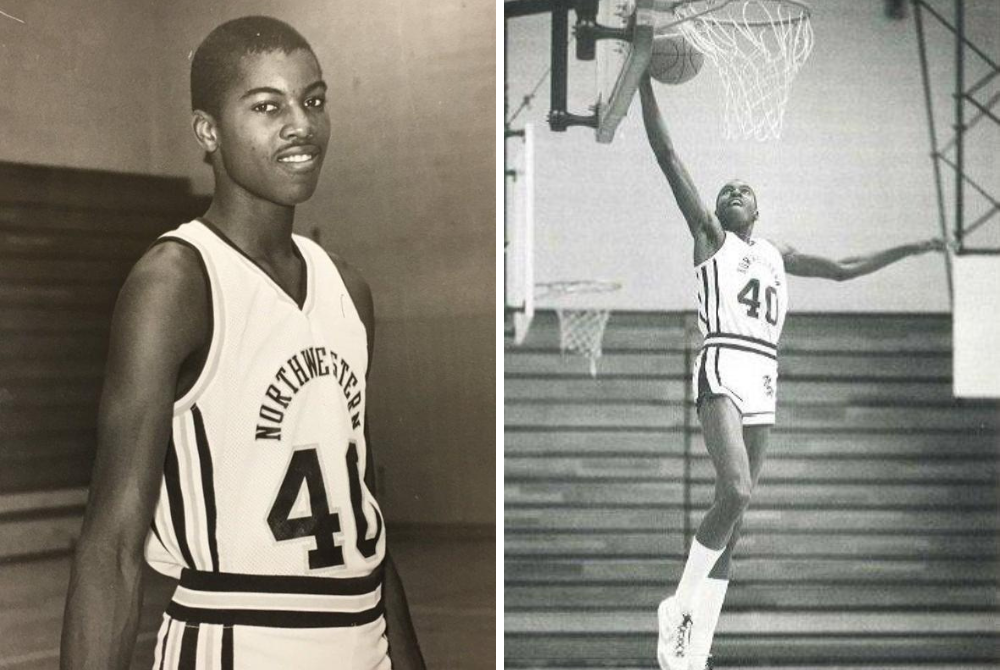
Johnston Retires as Winningest Coach, Much More to Beaverton Dream He Built
By
Paul Costanzo
Special for MHSAA.com
March 15, 2024
Before Roy Johnston left the court that bears his name for the final time as Beaverton head boys basketball coach on Feb. 23, 1,500-plus fans, family and current and former players had one more chant.
 It wasn’t the name of the coach they all adored after he wrapped up the winningest career in MHSAA basketball history. It wasn’t even the school song, or a slogan.
It wasn’t the name of the coach they all adored after he wrapped up the winningest career in MHSAA basketball history. It wasn’t even the school song, or a slogan.
With Johnston pumping a raised fist, the community chanted “Judy” to honor his wife, who could not be at the game or celebration as she was battling cancer.
It was a fitting tribute to the woman behind the coach who became more than the face of the community, and one last opportunity for those fans to say thank you to her for her own efforts and sacrifices in helping the Beaverton become something pulled straight from the movie screen – the small-town sports tale complete with the iconic coach in the lead role and generations of locals living their dedication by filling the stands for every game.
Judy Johnston passed away this past Saturday, a little more than two weeks after the ceremony that honored her husband. She was 81.
All interviews for this story were completed prior to her passing, but a common theme when talking about Johnston’s 50-year career and importance to Beaverton was that the entire family, specifically Judy, had played a big role.
“His family has put forth an incredible amount of effort into our community,” said former player Brent Mishler. “In basketball and in general.”
Family is at the center of Johnston and Beaverton’s immense success over his 50 years. Not only has he coached multiple generations of several Beaverton families – including three generations of Mishlers – but he’s coached his own children, and grandchildren.
Small town programs often rely on players who have grown up around them and together, and Beaverton has that in spades.
“It was a dream,” former player and Johnston’s co-coach, Shad Woodruff, said of having his son Layk play for Johnston. “I got to play for Roy and be part of all that Beaverton basketball is – it’s not just a sport around here. We have video of (Layk) dribbling a basketball in the gym literally before he could walk. He’s been the little guy that always looked up to (Roy’s grandsons) Spencer Johnston and Carter Johnston, so just to be a part of Beaverton basketball is special.
 “It’s like when your kid gets there, you’re giving your kid to the community for a while and saying, ‘Here you go.’ It’s amazing to watch your son out there, especially in a community like ours. Roy has created this thing with Beaverton basketball where every Friday night, it’s like church. Everybody’s there.”
“It’s like when your kid gets there, you’re giving your kid to the community for a while and saying, ‘Here you go.’ It’s amazing to watch your son out there, especially in a community like ours. Roy has created this thing with Beaverton basketball where every Friday night, it’s like church. Everybody’s there.”
The numbers behind Johnston’s career, which started in 1966 in Yale, are remarkable. He holds the MHSAA record for wins by a boys basketball coach at 833, the vast majority coming at Beaverton, the program he took over in 1974.
The Beavers won 21 conference titles, 17 District titles and five Regional titles during Johnston’s 50 years, adding a run to the MHSAA Semifinals in 1984.
Just six of Johnston’s seasons ended in records below .500, and in a fitting tribute to their coach, this year’s Beavers scratched and clawed their way to a five-game win streak at the end of the season to ensure his last wouldn’t be No. 7, finishing the year 12-12 with a loss to Beal City in the District Final.
Included in that streak was a 54-45 victory over rival Gladwin on the night Johnston was honored. The Beavers trailed by as many as nine during the second half before rallying to win, led by a 26-rebound performance from 6-foot, 1½-inch senior Reese Longstreth, who Woodruff called the epitome of a Beaverton basketball player.
“I’ve been fortunate to be around Roy for 40 years, and I’ve seen a lot of great wins, especially in that gym,” Woodruff said. “I can’t put anything above that one.”
Layk Woodruff made the final basket in the game, which will forever be the final basket made in Roy F. Johnston Gymnasium during the Johnston era.
“It was super emotional, I’d say, for a bunch of reasons,” Layk Woodruff said of the game. “We felt like it was our responsibility, we had to that game for Roy. It was a rivalry game, last home game of the year – there were a lot of emotions when that game ended. I didn’t even think about (hitting the final shot) until a couple days later. Now that I get to think about it, it’s pretty cool to say that was me. I’ll always remember that.”
One celebration led to another, as Johnston’s retirement ceremony followed the game. A tribute video created by Beaverton graduate Jason Brown, who owns a digital media company, and narrated by longtime Beaverton public address announcer Scott Govitz was played. Govitz admitted to getting choked up at times while recording the video.
“There were a couple times where I did more than one take,” he said.
Govitz was at the center of a massive effort to create the ceremony, with support from athletic director Will Gaudard, school staff and members of the community, including multiple businesses and organizations. Govitz had arranged for special lighting and video screens for the presentation. Special tickets were printed for the night – which also happened to be Beaverton’s Hall of Fame night. Following the video, a spotlight was shone on center court, where a single chair sat, one of Johnston’s vintage red blazers draped over its back.
The more than 100 former players who had come to celebrate their coach each had a glow stick they cracked on, and walked through the darkness to surround the chair.
Then Johnston walked the red carpet – much like his starters have for years when being introduced prior to games – and addressed the crowd.
He didn’t speak for long, but as Johnston so often does, he hit all the right notes, mixing gratitude with humor.
“Gladwin County is a great place to raise a good family,” Johnston said after thanking the traveling contingent from Gladwin.
“I want to thank everyone for a great run. Fifty years. A great run.”
For outsiders, it was a chance to see the softer side of Johnston rather than the man intensely patrolling the sidelines during games. It was a glimpse at the man that handed out suckers before games to every kid in attendance.
 “He belonged on an episode of ‘Grumpy Old Men,’ and he still could play the role,” Govitz said with a laugh. “He would always say, ‘Don’t listen to the way I say it, listen to what I say.’ He just wants you to do things correctly. His players, maybe they didn’t adore it at the time, but they adore it now. Being a part of that program taught them more than basketball skills. … What will happen, once they leave, they find that great respect for it. And, he does things quietly that no one ever knows or sees – helping someone in need, especially the ones in college, checking up on them or sending them some money. That helps build a program and build relationships. He said in his last speech that it’s about getting along with others. If you can’t get along well with others, you can’t get along. That’s what it’s about.”
“He belonged on an episode of ‘Grumpy Old Men,’ and he still could play the role,” Govitz said with a laugh. “He would always say, ‘Don’t listen to the way I say it, listen to what I say.’ He just wants you to do things correctly. His players, maybe they didn’t adore it at the time, but they adore it now. Being a part of that program taught them more than basketball skills. … What will happen, once they leave, they find that great respect for it. And, he does things quietly that no one ever knows or sees – helping someone in need, especially the ones in college, checking up on them or sending them some money. That helps build a program and build relationships. He said in his last speech that it’s about getting along with others. If you can’t get along well with others, you can’t get along. That’s what it’s about.”
Mishler echoed that sentiment, and some of the memories that stick out most to the 2002 graduate were when Johnston got after him in his own special way.
“Playing for him was a privilege,” said Mishler, whose father Steve played for Johnston in the ’70s, and his son Cameron played through 2021. “The life lessons he taught set you up for success in life for the future. ‘You need to hear what I’m saying, not the method I’m saying it.’ That’s so true. Being honest and having expectations, and expecting people to hit those expectations, is not a bad thing.”
After Johnston was done speaking, he knelt down and kissed the floor to say goodbye to the job he’s done for most of his life, and in a way, thank you, to the community he helped create and that he’ll now need more than ever.
“Roy’s good at making you feel like he’s not big on that stuff (being recognized), and he isn’t, but he definitely does appreciate it,” Shad Woodruff said. “He understands how important he is to the community, and that he’s done something really special. He understands what he’s done is a pretty big feat, but he doesn’t talk about it. He doesn’t brag about it.”
 Paul Costanzo served as a sportswriter at The Port Huron Times Herald from 2006-15, including three years as lead sportswriter, and prior to that as sports editor at the Hillsdale Daily News from 2005-06. He can be reached at paulcostanzo3@gmail.com with story ideas for Genesee, Lapeer, St. Clair, Sanilac, Huron, Tuscola, Saginaw, Bay, Arenac, Midland and Gladwin counties.
Paul Costanzo served as a sportswriter at The Port Huron Times Herald from 2006-15, including three years as lead sportswriter, and prior to that as sports editor at the Hillsdale Daily News from 2005-06. He can be reached at paulcostanzo3@gmail.com with story ideas for Genesee, Lapeer, St. Clair, Sanilac, Huron, Tuscola, Saginaw, Bay, Arenac, Midland and Gladwin counties.
PHOTOS (Top) Beaverton boys basketball coach Roy Johnston kisses the court that bears his name during a celebration of his retirement Feb. 23. (Middle) This season’s team stands at the entrance to town with signs announcing the program and coach’s successes. (Below) Johnston takes a photo with three generations of Mishlers – Cameron, Brent and Steve. (Top photo by Stephanie Johnston.)

Flashback 100: Rice's Championship-Winning Ways Started at Flint Northwestern
April 11, 2025
Walter Clayton Jr. led Florida to the 2025 NCAA men’s basketball championship, scoring a tournament-high 134 points over six consecutive victories. Despite his impressive performance, Clayton’s total still fell 50 points short of the all-time record for a single NCAA Tournament — held by Glen Rice, who scored 184 points during Michigan’s title run in 1989.
That 1989 NCAA championship wasn’t Rice’s first taste of victory. Before his college success, he led Flint Northwestern to back-to-back MHSAA Class A state titles in 1984 and 1985. The Wildcats compiled a dominant 55-1 record over those two seasons — a mark that stood as an MHSAA record until Powers North Central went 55-0 over the 2014-15 and 2015-16 seasons. In 1985, Rice averaged 28.6 points per game, finishing the season with 802 points — still the 22nd-highest total in state history.
Flint Northwestern’s 1984 boys’ basketball championship was the first in school history. That same year, the girls team also claimed the Class A title — marking its first championship as well — and repeated in 1985.
After winning titles in both high school and college, Rice went on to enjoy a 15-year NBA career, highlighted by an NBA championship with the Los Angeles Lakers in 2000. A three-time NBA all-star, he averaged 18.3 points per game over his career.
Rice remains the all-time leading scorer at University of Michigan, where his No. 41 jersey has been retired. Flint Northwestern High School closed its doors in 2018.
Previous "Flashback 100" Features
March 28: Youngquist's Times Still Among MHSAA's Fastest - Read
March 18: After 40 Years, Coles' Shot Remains Among Century's Most Famous - Read
March 7: Walled Lake Northern's Hellebuyck Reigns as NHL's Elite Netminder - Read
Feb. 27: Zeerip's Mat Stats Remain Rarely-Challenged Chart Toppers - Read
Feb. 21: Before TV Stardom, Kerwin Excelled as All-State Skier - Read
Feb. 14: Detroit Central Star Voted into Pro Football Hall of Fame - Read
Feb. 6: Multi-Sport Star Look Becomes Super Bowl Officiating Legend - Read
Jan. 31: Johnson Family Put Magical Stamp on Michigan High School Hoops - Read
Jan. 24: Future Hall of Famers Face Off First in MHSAA Class A Final - Read
Jan. 17: First-Ever WNBA Draft Pick Rocked at Salem, Won Titles at Tennessee - Read
Jan. 10: Despite Launching Before 3-Point Line, Smith Still Tops Scoring List - Read
Jan. 3: Edison's Jackson Earns Place Among State's All-Time Elite - Read
Dec. 20: Future Olympian Piper Leads Grosse Pointe North to Historic Heights - Read
Dec. 13: The Other Mr. Forsythe in Michigan School Sports - Read
Dec. 6: Coleman's Legendary Heroics Carry Harrison Through Repeat - Read
Nov. 29: Harbaugh Brothers' Football Roots Planted in Part at Pioneer - Read
Nov. 22: 8-Player Football Finals Right at Home at Superior Dome - Read
Nov. 15: Leland Career Helps Set Stage for Glass' International Stardom - Read
Nov. 8: Future Baseball Pro Led Escanaba's Legendary Football Title Run - Read
Nov. 1: Michigan High School Baseball Trio Provide World Series Voices - Read
Oct. 25: Before Leading Free World, Ford Starred for Champion GR South - Read
Oct. 18: Mercy Links Legend Becomes World Golf Hall of Famer - Read
Oct. 11: Fisher Races to Finals Stardom on Way to U.S. Olympic First - Read
Oct. 4: Lalas Leaves High School Legacies on Ice & Pitch - Read
Sept. 27: Tamer's History-Making Run Starts in Dexter, Continues to Paris - Read
Sept. 20: Todd Martin’s Road to Greatness Starts at East Lansing - Read
Sept. 13: James Earl Jones, Dickson High Hoops to Hollywood Legend - Read
Sept. 6: Pioneers' Unstoppable Streak Stretches 9 Seasons - Read
Aug. 30: Detroit dePorres Rushes to 1995 Class CC Football Championship - Read
(Photos courtesy of MLIVE/Flint Journal.)

